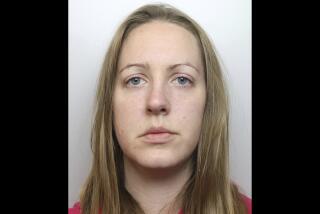Statistics Don’t Total Murder, Judge Rules
- Share via
UPPER MARLBORO, Md. — A judge today dismissed murder charges against a nurse accused of killing three patients with lethal doses of potassium, saying the prosecutors had done no more than prove she was present when the patients died.
Jane Bolding, 30, leaned back in her chair and broke into a wide grin when Prince George’s County Circuit Court Judge Joseph Casula, who had been hearing the non-jury trial since May 18, read his response to last week’s defense motion that the state had failed to prove its case.
After the judge finished, Bolding, blinking back tears, hugged each of her three attorneys.
Statistics Not Enough
Casula said merely the statistical evidence--the centerpiece of the prosecution’s case--was not enough to sustain a conviction.
Prosecutors had alleged that Bolding, then an intensive care nurse at Prince George’s Hospital Center, killed three patients by injecting them with potassium chloride, which can induce heart attacks in high doses.
Defense attorneys engaged in extensive cross-examination of the state’s witnesses, but did not call any witnesses.
The strongest aspect of Assistant State’s Atty. Jay Creech’s case had been a study by the federal Centers for Disease Control that showed Bolding was the primary nurse on duty when 57 heart attacks occurred. The next highest number for any nurse was five.
Too Many Cardiac Arrests
Dr. Jeffery J. Sacks, who wrote the study, testified that intensive care patients at Prince George’s Hospital Center had 88 cardiac arrests on shifts Bolding worked from January, 1984, to March, 1985, the period that was examined.
Health statistics indicated that only 31 seizures should have occurred, and Sacks testified that the chances of Bolding not being responsible for the unusually high number were about one in 100 trillion.
However, Sacks also stressed under cross-examination that his study could not be used to address intent to commit a crime, and Casula ultimately ruled that using the study to convict Bolding would set a dangerous legal precedent.
“It would create a mathematical quagmire” if circumstantial evidence from the statistical study had been used to reach a guilty verdict, Casula said.
More to Read
Sign up for Essential California
The most important California stories and recommendations in your inbox every morning.
You may occasionally receive promotional content from the Los Angeles Times.












